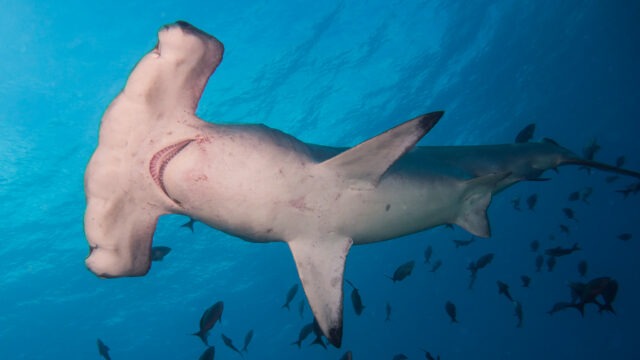
Costa Rica’s Pacific hammerhead shark populations could be in a delicate situation, according to recent data from the Costa Rican Institute of Fisheries and Aquaculture (Incopesca).
The information shows that, between 2017 and 2019, the number of hammerhead sharks landed in national ports plummeted by 94%. This, according to biologists, could be a sign of overfishing.
The information suggests possible overfishing of these animals, said Fins Attached biologist Randall Arauz. “These data are very worrying because they are signs of overfishing and that the population is collapsing,” he said.
Until a week ago the export of hammerhead sharks was allowed in Costa Rica, following a decree of the Solís Rivera administration in 2016. This even though the three species that inhabit the country are threatened with extinction.
Two species in particular have a greater record of landing in Costa Rican ports: the common hammerhead shark (Sphyrna lewini) and the smooth hammerhead shark (Sphyrna zygaena). In 2014, for example, more than 8,000 bodies of the latter were unloaded.
But in very little time, the download drastically decreased. While in 2017, Incopesca recorded the landing of 7,556 hammerhead shark bodies between both species, for 2019, only 448 bodies were landed in total. The data also shows that 86% of the landed sharks had not reached sexual maturity. This would be a “serious” practice, as reported by the Scientific Advisory Committee of Incopesca.
The Institution requested “the improvement of fishing inspections, in such a way that the commercialization of these sharks is not allowed, if they do not meet the size of first sexual maturity”, according to the Non-Harmful Extraction Opinion 2020-2021.
Hammerhead sharks reproduce slowly – it can take 15-17 years to reach sexual maturity. Because of this, protecting young individuals is key to the conservation of the species, explained Jorge Arturo Jiménez, director of the Marviva organization.
Incomplete information
Incopesca data provides a clue: the population could be at risk. But the information is not enough to conclude this, said the marine biologist of the Marine Research and Conservation and the Endangered Marine Species Rescue Center (CREMA) organization, Jeffry Madrigal.
The information reflects only the sharks that are caught and landed in ports, but this is not necessarily the total catch. There may be captured sharks that are discarded before reaching the port, explained the expert.
To know the real impact on the population, biologists analyze a piece of data called “catch per unit of effort”. That is, out of every thousand hooks cast, how many sharks are caught. With this information, biologists could analyze whether fewer sharks have been caught over the years. Incopesca, however, did not provide these data, according to the official letter PESJ-338-2020.
The Institution assured that this information is granted exclusively to the Inter-American Tropical Tuna Commission (CIAT). “It is within this Commission where a group of specialists issues recommendations for the management of pelagic or highly migratory species, which are binding,” says the document.
Overfishing, an alarming situation

Overfishing is one of the main threats to the shark population worldwide. Of the eight known species, three inhabit Costa Rican waters under some degree of threat. A recent study by the University of Costa Rica (UCR) showed the “impact of fishing in national waters”: the diversity and quantity of sharks decrease drastically in fishing areas, but increases in protected areas.
Until a week ago, the export of hammerhead sharks was allowed in Costa Rica, despite being an endangered species. A 2016 decree led Incopesca to categorize them as a “commercial species”.
However, the Supreme Court repealed this decree and its related decisions on November 16th of this year, so now a scientific committee must decide whether to allow the export of this species.
The capture of the domestic market is allowed with certain restrictions for the longline sector. One of them, for example, is to land in national ports with the complete body of the shark. This, however, does not always happen.
In 2017, the Puntarenas Criminal Court sentenced a businesswoman with the surname, Tseng Chang, to six months in prison for the crime of fluttering. She unloaded shark fins at the El Carmen dock in Puntarenas without being naturally attached to the animal’s body.
“Costa Rica must immediately prohibit the capture and retention of the hammerhead shark, as well as the domestic possession and commercialization of its parts if the country sincerely wants to save this emblematic species from its imminent extinction,” said Arauz.

